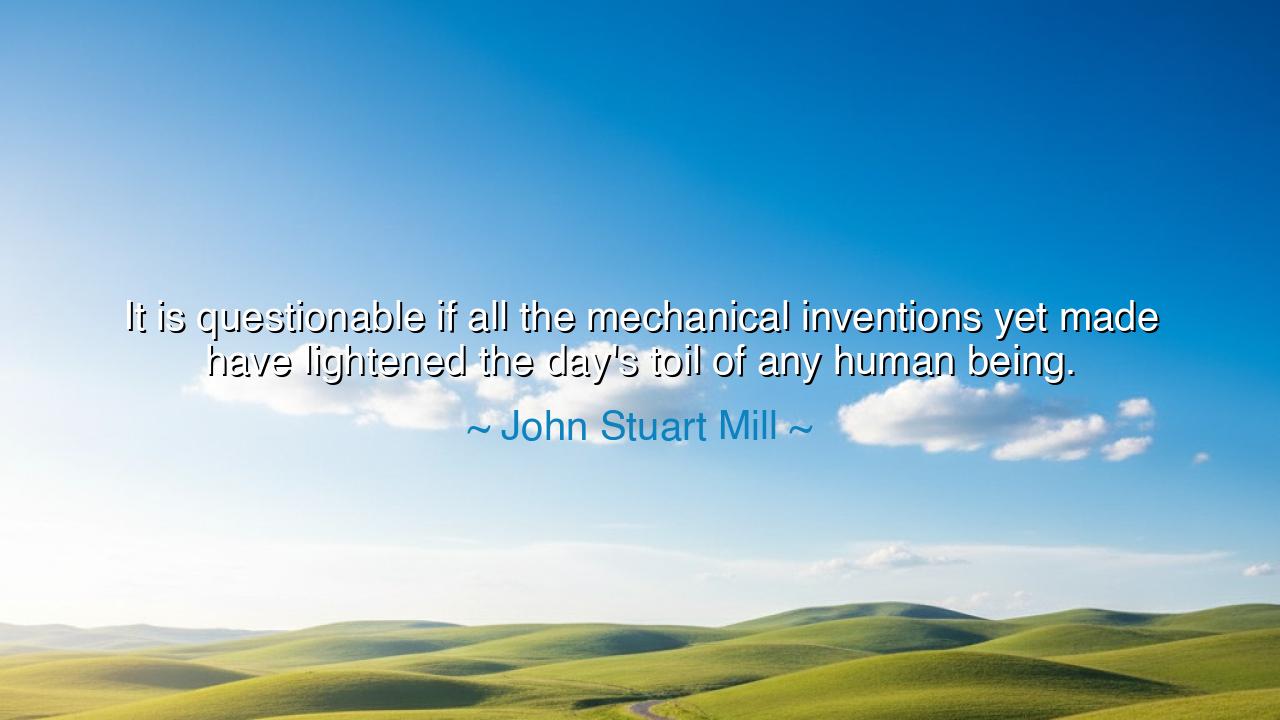
It is questionable if all the mechanical inventions yet made
It is questionable if all the mechanical inventions yet made have lightened the day's toil of any human being.






When John Stuart Mill, philosopher of liberty and voice of reason in the nineteenth century, declared, “It is questionable if all the mechanical inventions yet made have lightened the day's toil of any human being,” he spoke with the insight of one who had watched the rise of the Industrial Revolution with both awe and sorrow. He saw a paradox unfolding: mankind had filled the world with engines, looms, and machines, yet the burden of the laborer seemed scarcely lighter. The inventions multiplied wealth, but did they bring rest? Did they grant leisure to the weary soul, or did they merely demand more from flesh and spirit?
Mill’s words pierce to the heart of progress. For while mechanical inventions promise relief, their fruits are often captured not by the many but by the few. The spinning jenny, the steam engine, the power loom—all these were heralded as saviors of labor, yet in the factories of Manchester and London, men, women, and even children bent their backs from dawn till dusk, their toil unending. The machines multiplied production, but they also multiplied expectations. What was once a day’s labor became the starting point for a new, harsher demand. Thus Mill’s doubt: had toil truly lessened, or had it simply changed its form?
Consider the tale of the Luddites, workers of early industrial England who rose against the machines. They were not enemies of invention, but of exploitation. They saw that the looms and frames did not lighten their burden but stripped away their craft, reduced their labor to monotony, and demanded longer hours for less pay. They struck out in desperation, not against progress itself, but against the cruel truth that progress had not reached their lives. Their struggle gives flesh to Mill’s suspicion: machines may create riches, but do they bring dignity?
The truth of Mill’s words is timeless. Even in later ages, when electricity, automobiles, and computers arose, the promise of leisure often remained unfulfilled. Each new invention freed time only for that time to be claimed by greater demands. The typewriter quickened correspondence, but offices then demanded more letters. The washing machine lightened household chores, but expectations of spotless homes grew. The smartphone placed the world in our hands, but it also tethered us to labor without end. Invention, without wisdom, may only accelerate toil.
Yet Mill’s voice is not merely lament—it is also a challenge. His words force us to ask: What is the purpose of invention? If machines exist only to make men work harder, then they serve not humanity but profit. If they grant wealth to the few and weariness to the many, then they fail the true measure of progress. The worth of invention must not be judged by efficiency alone, but by whether it brings freedom, leisure, and joy to human lives.
O seekers of wisdom, the lesson is clear: be not blinded by the glitter of mechanical inventions. Honor them, yes, for they are fruits of genius. But measure them rightly: ask always whether they lighten burdens, whether they enrich the spirit, whether they serve the dignity of mankind. Do not allow the gifts of invention to become new chains of toil. For machines should be our servants, not our masters.
Therefore, let Mill’s words echo within you: “It is questionable if all the mechanical inventions yet made have lightened the day's toil of any human being.” Let them be a warning against progress without compassion. Seek to build and embrace technologies that free men and women not merely to labor more, but to live more. And in your own life, remember: efficiency is hollow if it steals away rest, if it leaves no time for love, reflection, or the pursuit of truth. The goal of progress must be not only to produce, but to liberate.






AAdministratorAdministrator
Welcome, honored guests. Please leave a comment, we will respond soon